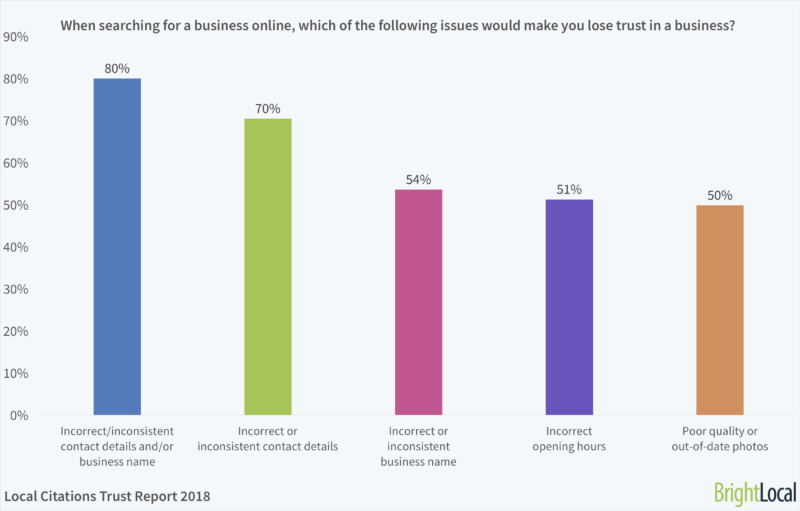How to regain trust lost by bad business listings
Whether it's spring or fall, cleaning up your local business listings is a good idea, says contributor Jamie Pitman. If you don't, be prepared to lose customer trust and search rankings.

But not everything’s about rankings, is it? Accurate citations are still a foundational tactic for any business, as they increase online visibility by placing businesses in the listings and directories where potential customers are looking for them.
That’s if they are accurate. What happens if they’re not?
Recent research published by BrightLocal (my company) suggests 93 percent of consumers are frustrated when they come across incorrect business information online, and 80 percent lose trust in businesses that show inaccurate details online.
Ouch. That’s a lot of unhappiness.
The first remedial course of action is to make sure your online citations and business directory listings are 100 percent accurate (not an easy feat for businesses with hundreds of locations, but clearly worth the effort), but what else can you do in the meantime to ensure this kind of experience, if it does occur, doesn’t damage trust in your business?
Here are a few ways you can ensure your potential customers don’t head to your nearest competitor while you are fixing your listings.
An accurate website= happy customers
My first tip is an obvious one for smaller businesses, but it presents potentially more of a risk for larger businesses with multiple location pages on their sites: Make sure your physical (location) address(es) is accurate on your website.
If you are a search engine optimization specialist (SEO) working with a multilocation business, get them to build a database of all current location addresses and perform a site audit to make sure they are all consistent.
From my experience, you’d be surprised how often I’m told multilocation businesses don’t have a centralized location for all business addresses. To the layman, this sounds like a no-brainer, but to the in-house marketer or data wrangler sitting before a gigantic, regularly changing spreadsheet of hundreds of ZIP codes, it’s a ton of work.
However, it’s foundational work that needs to be done. After all, without having a database of all location addresses in the first place, there’s no way you’ll be able to ensure correct citations and business listings when going ahead with citation cleanup work.
Update local content silos
If you’re creating local content silos, then, along with the long list of addresses, you’ll need to gather URLs of every place on the site where address or location information is displayed. Local content silos will have a great deal of location information on them, and if a business location closes or changes address, these local area-focused parts of the site will end up doing more harm than good.
Ultimately, if you don’t update your website immediately once location information changes, when someone suspects your listing data is wrong and comes through to see those details confirmed on-site, you’ll be sending them on a wild goose chase and directly into the hands of nearby competitors.
Include social proof on your website
Thanks to widespread research, we now know that consumers tend to trust their peers more than businesses and organizations (although, quite depressingly, even trust in “people like me” has fallen, according to the 2018 Edelman Trust Barometer), so, to boost trust for the visitor who’s come to your site to check your phone number and address, include testimonials from happy customers and, if possible, user-generated content that showcases your products and services in an authentic way.
When gathering and putting together testimonials for your site, there are some key things to remember and to include:
- No name, no go. Someone who was perfectly happy to submit a testimonial should also be happy to put their name to that quote, so be sure to display it. Testimonials with just the first names should only occur when dealing with sensitive information (when using quotes from attorney clients, for example).
- Location, location, location. If dealing with business-to-consumer (B2C) markets, try to include their city, town or state, so that potential customers on your site can better judge how similar their experiences are likely to be. If you cater to a business-to-business (B2B) industry, include the business the happy client or customer works for.
- Image is everything. Testimonials should include a clear headshot of the satisfied client or customer. This will lock in that trust and ensure that visitors have faith in the associated comment.
Educate staff at bricks-and-mortar locations
As you can see below, 43 percent of consumers said they would call the business if they found incorrect or inaccurate business information online.
Now, it goes without saying that if an incorrect address dovetails with an incorrect phone number, you’re out of luck. But if you’re aware of a situation in which incorrect addresses, services or products are being displayed online, it’s crucial that you inform all staff that deals with the public of the error.
Employees manning the phones are going to be the first port of call (if you’ll pardon the pun) when a potential customer wants to clarify a location’s address, so to keep your staff from sounding shocked or dismissing people’s comments when a frustrated prospect calls. Get your location managers to share the details of the error with staff and ensure them that it’s being rectified.
Saying “Sorry about that; we’re aware of the issue and are working on fixing it,” provides a far better experience to someone on the receiving end of incorrect information. Providing you’re taking the appropriate steps to clean up your location citations, your staff and customers should forgive the error and, in some cases, even see the funnier side of it.
Maintain a positive reputation
So far, these suggestions have focused on online and in-store experiences, but you may well be able to head the issue off at the pass if you can create and maintain a positive reputation at the source.
A great many citations exist on sites with reviews attached to listings (e.g., Google My Business, TripAdvisor). So, carefully managing your online reputation by responding to negative reviews politely and considerately, and in a timely fashion, will build up extra trust in your business before the searcher discovers the near-fatal flaw in your business information.
This practice is obviously something every business should be serious about, but the added incentive of buffering the business against any potentially frustrating online and offline experiences before they happen should serve as an additional benefit of solid reputation management.
It’s worth taking a moment to talk about how reputation management, and the fight against incorrect online info, extends to Google My Business’s relatively new Q&A feature.
Although I’d say the feature is still in its nascent stages, it’s another way for potential customers to gauge the sentiment around a business before getting in touch or visiting the website. In fact, I’ve seen several cases in which Google My Business question and answer (Q&A) has been used to directly question business information (see below).
Monitoring and managing Google My Business Q&As is clearly a good way of ensuring that, even if you’re aware of incorrect business information appearing online, you can directly respond to people who are having issues contacting or visiting your business. It could even be the way you’re informed that your details are out of date in the first place.
Conclusion
Clearly, if a business is not paying enough attention to their online data, and unless measures are taken to fix it while reinforcing trust in other ways, there’s a very real risk of customers going elsewhere. Now might be a good time to do some spring cleaning of your online business details!
Contributing authors are invited to create content for Search Engine Land and are chosen for their expertise and contribution to the search community. Our contributors work under the oversight of the editorial staff and contributions are checked for quality and relevance to our readers. The opinions they express are their own.
Related stories




